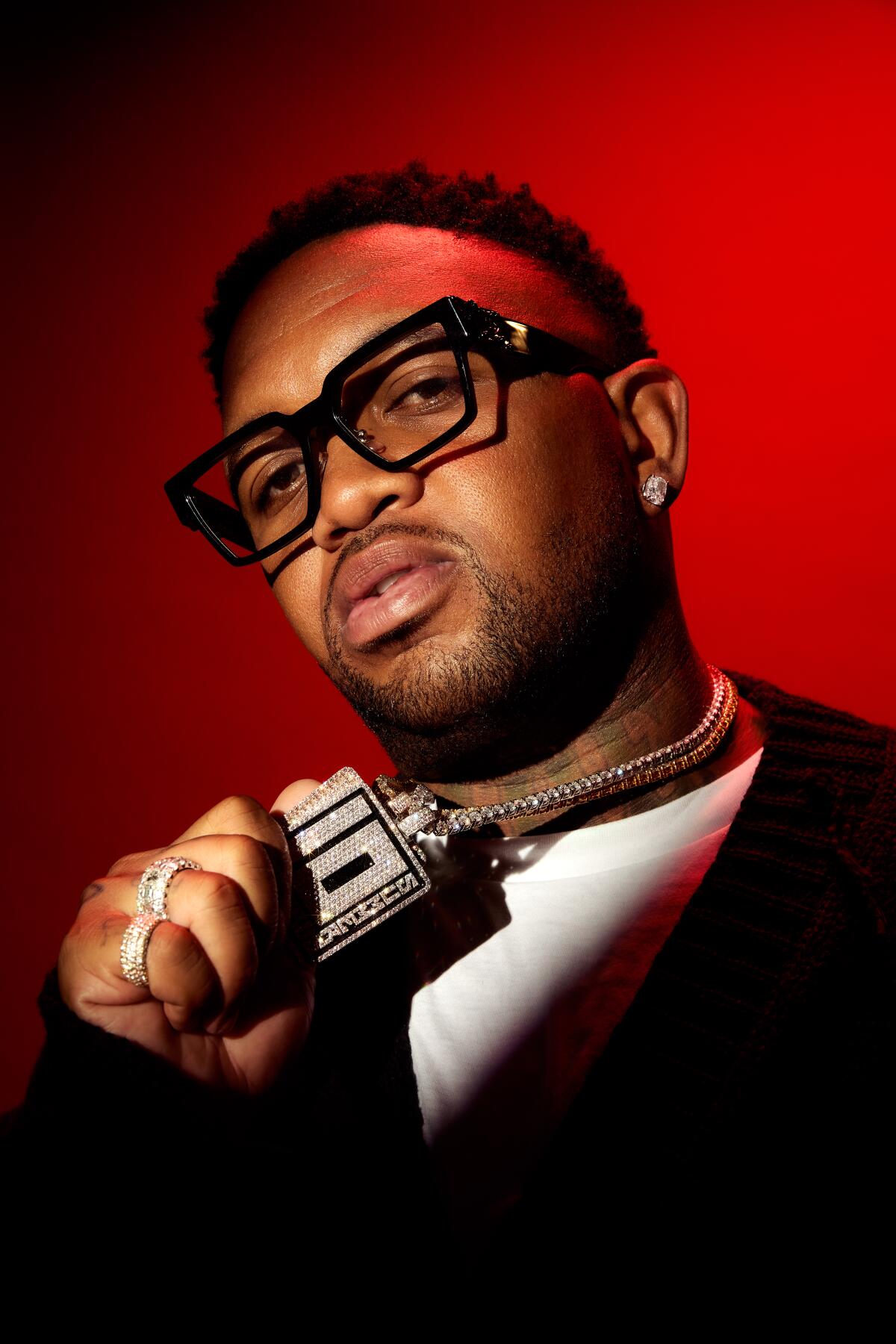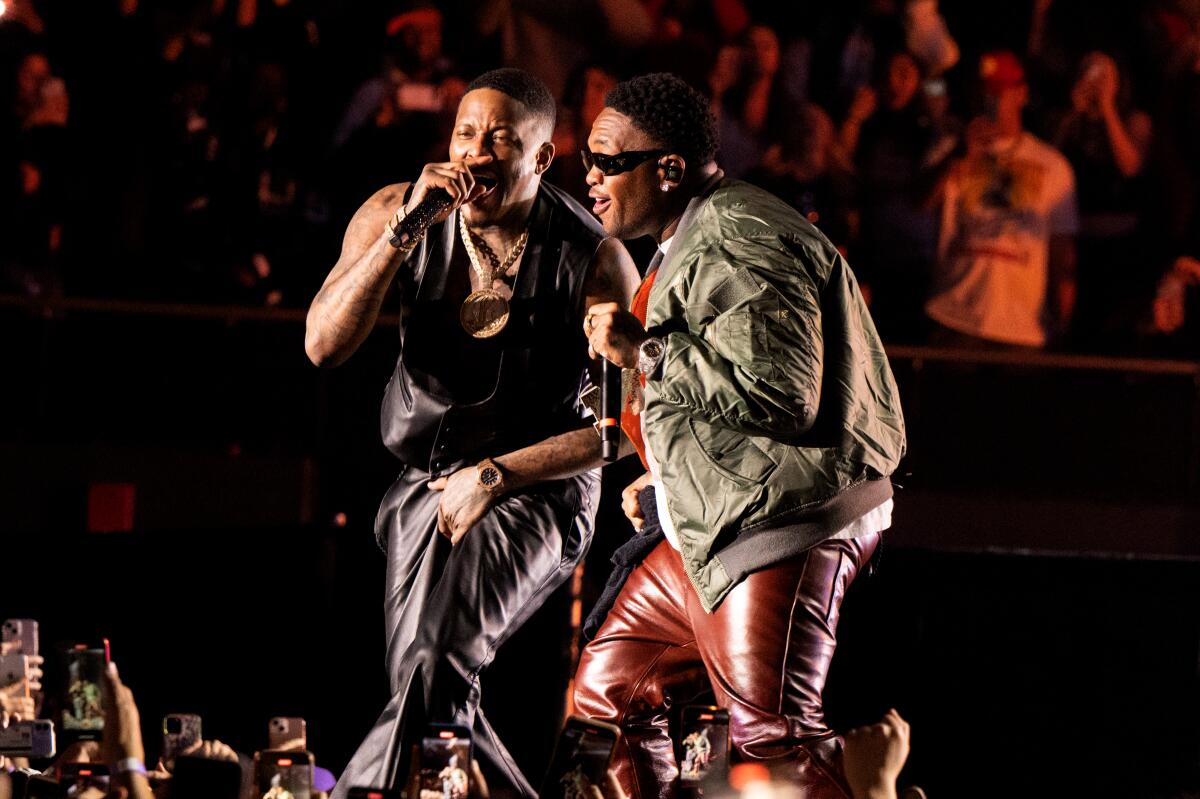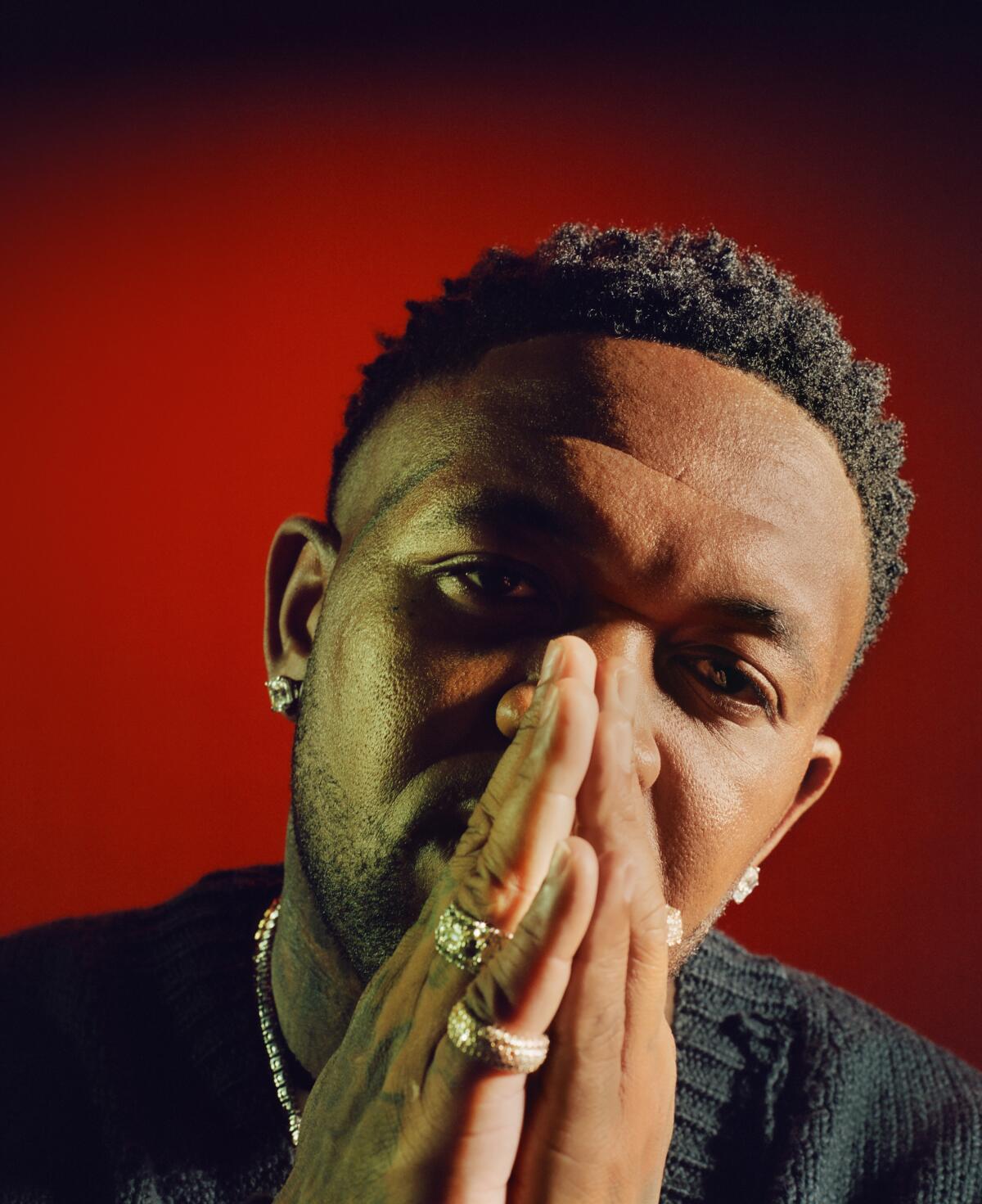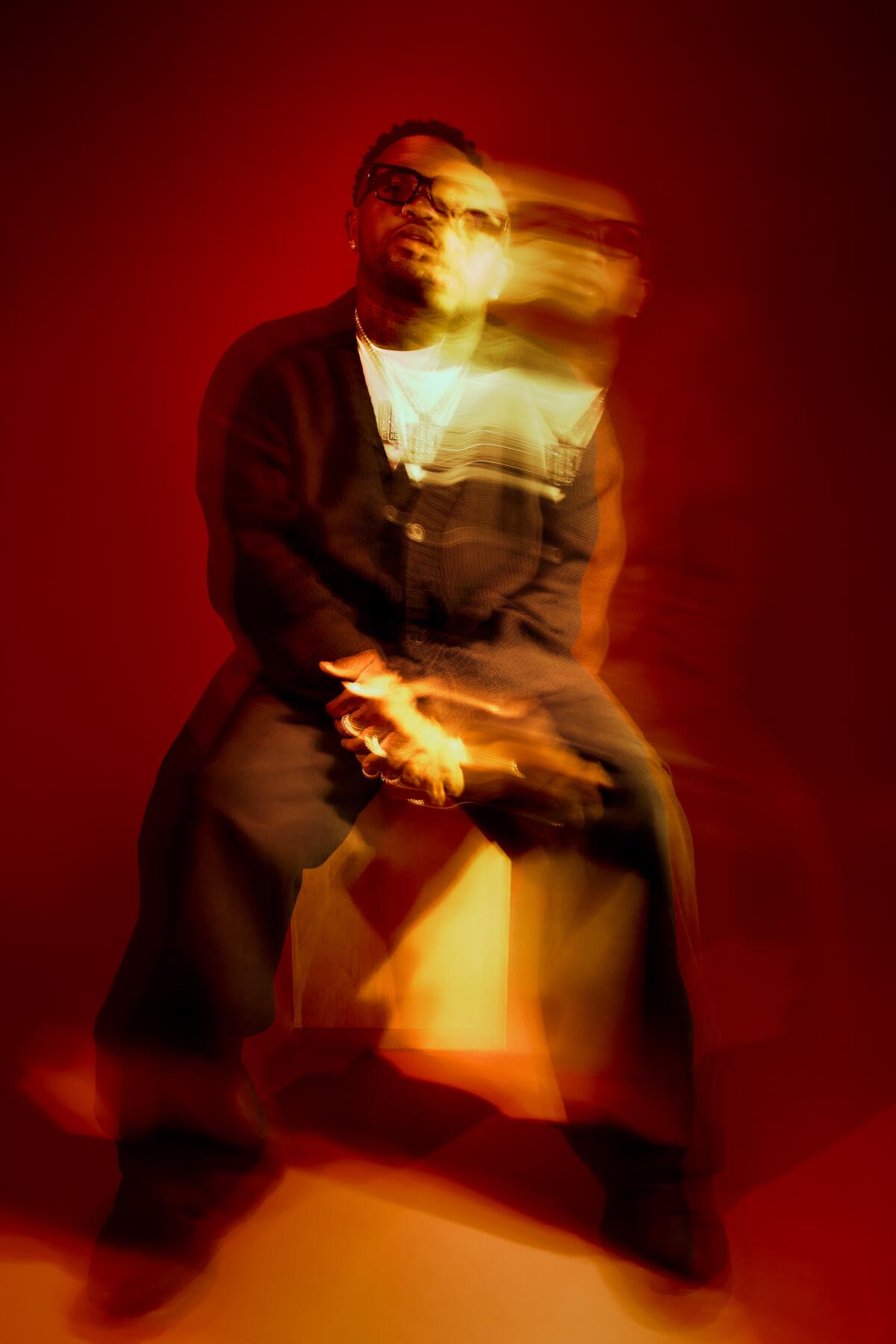The biggest entertainment stories
Get our big stories about Hollywood, film, television, music, arts, culture and more right in your inbox as soon as they publish.
You may occasionally receive promotional content from the Los Angeles Times.

Yes, Mustard saw the viral video of the Amazon delivery driver dancing in the street to Kendrick Lamar’s “Not Like Us.” And yes, he saw the kid in the blue dress shirt wilding out to the song in a clip from a recent Kamala Harris campaign rally.
But the moment that really hit home for the hip-hop producer, whose work on “Not Like Us” helped Lamar land the knockout blow in his historic rap battle with Drake, was watching his 9-year-old daughter perform a routine to the track in a group recital at dance camp the other day.
“She was right in the front, and I’m like, ‘You guys are dancing to a diss song about Drake — at school,’” he recalls with a laugh. “That was the best s— ever.”

A festive, if savage, takedown set to a deviously catchy horn lick, “Not Like Us” has been virtually impossible to avoid since it dropped late on a Saturday afternoon in May — if you heard it that evening, you know exactly where you were — and vaulted immediately to the top of Billboard’s Hot 100. Since then it’s racked up more than 1 billion streams on Spotify and YouTube, led to think pieces about race in the Atlantic and the New Yorker and inspired at least one brass band to turn the song into an attack on former President Donald Trump.
In an era of increasing cultural niche-ification, when grabbing everyone’s attention is as difficult as it’s ever been, “Not Like Us” achieved something like true omnipresence this summer — one reason it’s a presumed front-runner for record and song of the year nominations as Grammy season approaches.
Yet the song’s runaway success is just the latest feather in the cap for Mustard, 34, a South Los Angeles native who’s been a kingpin of West Coast rap for more than a decade thanks to the sleek, bass-forward beats he’s devised for hits like Tyga’s “Rack City,” 2 Chainz’s “I’m Different,” YG’s “Big Bank,” “Show Me” by Kid Ink and Chris Brown and his own “Ballin’” featuring Roddy Ricch; beyond those hip-hop tracks, he’s produced lush and spacey R&B jams such as Tinashe’s “2 On,” Rihanna’s “Needed Me” and Ella Mai’s “Boo’d Up,” which earned a song of the year nod at the Grammys in 2019 and took the prize for best R&B song.

“Mustard’s ear — his understanding of what sounds work together and who sounds good on something — it’s unmatched,” says Mai, who’s signed to Mustard’s record label, 10 Summers. “He’s never steered me wrong.”
Last month, Mustard (whose real name is Dijon McFarlane) released his fourth solo album, “Faith of a Mustard Seed,” with guest spots by Kirk Franklin, Lil Yachty, Quavo, Vince Staples, Charlie Wilson, Future, Ty Dolla Sign and Young Thug, among others. Rich with thoughts of family and memories of his childhood — including the countless hours he spent roller-skating at L.A.’s beloved World on Wheels — it’s both his most personal effort yet and a subtle expansion of his signature sound.
“As the producer, you never get to talk, so I just wanted to give some insight into my life,” he says of the album’s 10-minute closer, “Pray for Me,” in which he raps about his experiences in the church and about losing two grandparents to COVID-19 and about his dad being deported to Jamaica when Mustard was just 6 or 7. He’s kicked back in a rolling chair on a recent afternoon at his recording studio in Burbank, his crisp white sneakers propped on the mixing desk before him; racks of keyboards line the walls of the control room, and there’s a framed plaque from Billboard commemorating the No. 1 showing for “Not Like Us.”
“Just because you’re famous don’t mean you don’t have real s— going on,” he adds.

Though Mustard’s early hits weren’t built around samples, many of the songs on “Mustard Seed” utilize bits of old records, a shift the producer attributes to “listening to a lot of Dr. Dre” and to a desire “for some type of elevation” of his music. “I wanted it to sound more grown,” he says.
In “A Song for Mom,” he loops up one of his mother’s favorite songs, Luther Vandross and Cheryl Lynn’s version of Marvin Gaye’s “If This World Were Mine”; “Parking Lot,” which features Travis Scott, borrows from a mid-’70s gospel tune by the group Sweet Spirit. “It gives you a nice summertime feeling,” Mustard says of “Parking Lot,” which has been streamed more than 60 million times on Spotify. “For that one I didn’t want to do anything super-aggressive that had to compete with ‘Not Like Us.’”
Not that anything really could compete with a song so powerful that Lamar performed it five times in a row at his all-star Juneteenth concert at Inglewood’s Kia Forum — a crowd-pleasing flex all the more remarkable given that the song accuses Drake of being a pedophile and a cultural colonizer.
The pop-soul hitmaker played the first of two shows on Thursday night to welcome fans to the Clippers’ new $2-billion home.
“I was right by the stage looking up at him as he was performing that night, and it was like everybody was getting healed,” says Terrace Martin, the well-connected musician and producer who’s worked with Lamar and Snoop Dogg, among many other West Coast giants. “The biggest gangsters in the room were crying and hugging, and not because they were feeling good about burying Drake. It was just about everybody being in the same room having a good time together.
“And that was just the first time he played it,” Martin adds. “Every time he did the song, it triggered a different emotion.”
Mustard had no sense that his beat for “Not Like Us” was destined for greatness. Constructed around a sped-up snippet of “I Believe to My Soul” by the late jazz and R&B saxophonist Monk Higgins, it was just one of many tracks he’d texted Lamar in hopes of collaborating someday; he remembers that Lamar “hearted” that particular message in their chat but didn’t know how the rapper had used the instrumental until “Not Like Us” came out amid the beef with Drake.
“Then it was like the world stopped,” he says. “I was on the freeway going to a baby shower and when I got there, there was a party next door and they were already playing it.” After the baby shower he flew to Las Vegas for a DJ gig. And did he play the song himself that night?
“Hell, yeah!”

Asked whether he has a favorite line of Lamar’s in the song, Mustard grins. “‘Beat your ass and hide the Bible if God watchin’,’” he says. “You know how crazy that is to say to somebody?”
In 2016, Mustard appeared on the popular “Breakfast Club” radio show and said, “I don’t want no problems with nobody,” and insisted that his old friend YG was the only rapper for whom he’d produce a diss track.
“I’ve seen the clip — kind of funny,” he says today. “I really don’t want to be a part of no bulls—. But this is Kendrick Lamar. It’s different. This is history.”
Of the Compton-born Lamar, who won a Pulitzer Prize for his 2017 album “Damn,” Mustard says, “He’s just a genius. He does the unthinkable every time. And on a human level — just as a normal person — I like his style.” Mustard admires the fact that, rather than engage in the hurly-burly of social media, Lamar will disappear from public view for long stretches of time. “His whole mystique gives me the same vibes as Prince. Even now [after the success of ‘Not Like Us’], the guy has not posted anything. I told him, ‘I don’t know how you do that s—. Me, I’d be like, “Yeah, I’m No. 1!”’”
Indeed, Mustard got into it with Drake’s audience on X this month after some mocked the first-week sales of “Faith of a Mustard Seed,” which led Mustard to call Drake “the Malcolm X of white people” and to describe the rapper’s hyper-motivated stan army as “the Nation of drizzlam.”
“These guys don’t go to sleep — all they do is tweet, tweet, tweet, tweet,” he says. “That’s where ‘the Nation of drizzlam’ came from. I said it in a joking manner, but I guess on Twitter it looked like I was mad.” He laughs. “Drake should use that phrase. I won’t charge him for it.”

Can Mustard see himself ever producing a song for Drake? “I don’t think I want to make a song with that dude,” he says. “He’s a strange guy.” Also strange in Mustard’s view: the former president whose branding as “weird” by Democrats shares something with the get-a-load-of-this tone of “Not Like Us.”
“I mean, they got some weird cases too,” Mustard says of Trump and his associates, quoting a line from Lamar’s song about a member of Drake’s crew who’s been accused of assault. “Trump is definitely f—ing weird, and he’s definitely not like us.”
Years before he was helping to put catchphrases into the pop lexicon, Mustard grew up in South L.A. and learned to spin records from a father figure of an uncle, Tyrei Lacy, also known as DJ Tee. His first gig was a backyard party, where his uncle left young Dijon to entertain the crowd by himself after saying he’d forgotten something at home.
“To this day, I’ve never known if he did that on purpose or if he really left something at the house,” Mustard says.
Taylor Swift, Beyoncé, Sabrina Carpenter — and, of course, “Not Like Us”: Here’s a look at the best songs of 2024 as we approach the year’s halfway mark.
By 12 or 13, Mustard was making money playing functions around the neighborhood; by the time he graduated from Dorsey High in Baldwin Hills, he’d figured out how to make his own beats and started producing records for YG and others. He scored his first top 10 hit when he was only 21 with “Rack City,” then notched a platinum album with YG’s 2014 “My Krazy Life.”
In the mid to late 2010s, Mustard dabbled in EDM, an experience he looks back at with mixed feelings. “I realized that world is not so welcoming as you may think,” he says. “I’d go to these festivals and kill the set, but they’d never move me up [on the bill]. I would never be DJ Snake or RL Grime because they were…” He trails off. “I don’t want to say it’s Black or white, but it kind of threw me off a little bit.”
For “Faith of a Mustard Seed” he sought encouragement from Pharrell Williams, who told him to take chances and directed him toward some particular keyboard models, and Jay-Z, who assured him he sounded good as a first-time rapper on “Pray for Me.”
“That’s all I needed to hear,” Mustard says. “That was enough for me to be like, OK, cool, I can do this.”

Though it addresses rough patches in his life, Mustard says the album reflects the optimistic place he’s in right now. A daily tennis player, he’s been “on a weight-loss journey,” as he puts it, that began during the depths of the pandemic, when “I was having panic attacks in the house — like, I’m 300-something pounds, if I catch COVID, I’m gonna die.” Filing for divorce in 2022 from his ex-wife, Chanel Thierry, was another positive move for the father of four.
“I don’t mean that with any shadiness,” he says. “But when you’re unhappy with somebody, your kids see that. When I was married, I didn’t used to be at home. I’d be in the studio — I’d sleep here. Now I’m at home swimming and barbecuing, and my kids aren’t seeing me and their mom arguing all the time.”
He’s even generous in regards to the Recording Academy, which has come in for plenty of criticism over the years from trailblazing Black musicians — Drake and Kanye West and Jay-Z among them — who believe the organization doesn’t grasp the complexities of hip-hop and R&B when deciding who to reward with Grammys.
“I don’t think it’s as deep as everybody is making it,” Mustard says, adding that the real problem is that Grammy voters who do get it simply don’t bother to cast a ballot. “They’ve dropped the ball before, don’t get me wrong. But it’s not because of [the academy] as a whole.” He laughs. “I felt like we got snubbed for ‘My Krazy Life,’ but I didn’t vote! Imagine me not voting for my own s—.”
Has he allowed himself to imagine going up for one of the ceremony’s big prizes with “Not Like Us” — almost certainly the most spiteful record ever to be in the hunt for a major Grammy?
“Maaannn,” he says, leaning his head back in an amused reverie. “And think about if we win. That’s a big night. Big win for the Coast.”

The biggest entertainment stories
Get our big stories about Hollywood, film, television, music, arts, culture and more right in your inbox as soon as they publish.
You may occasionally receive promotional content from the Los Angeles Times.